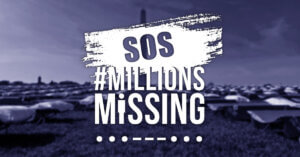This Giving Tuesday, I’ve got some good science to show why you should donate to #MEAction and other advocacy organizations!
The study Disease Politics and Medical Research Funding: Three Ways Advocacy Shapes Policy sets out to discuss single-disease interest groups and their influence on US politics:
“This article explores their effects on federal medical research priority-setting. Previous studies of advocacy organizations’ political effects focused narrowly on direct benefits for constituents. Using data on 53 diseases over 19 years, I find that in addition to securing direct benefits, advocacy organizations have aggregate effects and can systemically change the culture of policy arenas.”
The article is a fascinating read, laying bare the influence that primarily-female diseases (or diseases that primarily affect POC) have on research funding and discussing the advocacy strategies most likely to lead to increases in funding — including focus on disease-burden.
But the most important conclusion for this #GivingTuesday is the following:
The results reveal a strong relationship between advocacy and funding changes. Increases in the number of nonprofits and lobbying expenditures are both significantly associated with increases in research funding, with each $1,000 spent on lobbying associated with a $25,000 increase in research funds the following year…. These findings suggest that disease advocacy organizations secured direct benefits in the form of increased medical research funding.
It was Jenny Horner who alerted us to this paper. “I donate to several ME charities,” Jenny said. “This time I chose #MEAction because it can be hard for campaigning charities to fundraise. I recently read a study which indicated that for every $1 donated to a disease specific advocacy charity the (US) government contributes $25 to research the following year, presumably as a consequence of increased lobbying and awareness. So I’m hoping my donation will be immediately tripled and then the impact increased 25x by 2019! Fingers crossed…”
Thanks, Jenny! And thanks to everyone who donates (and spreads the word!) this #GivingTuesday.
Together we can create change. We are doing it every day.
[button_color url=”https://meaction.net/2018/11/16/givingtuesday/” content=”Donate and be triple-matched today!” target=”https://meaction.net/2018/11/16/givingtuesday/”]




6 thoughts on “Research: supporting advocacy orgs yields huge payoffs”
Hi Jaime, thanks for the credit, it was actually Cher T who alerted me to this a while ago to do with #MEAction UK.
It is a very interesting paper for disease advocacy orgs. Yesterday I concentrated on picking out the impact of donating because it was GivingTuesday. There are other interesting points in it too. The paper also seems to have something to say about how we divide up the categories of fundraising (and so the resulting research) which made me think of the apparent overlap with ME and other conditions.
Thanks, Jenny! Good to know. You are the one who alerted staff at #MEAction this week… AND thanks to Cher T, for finding the paper initially!
I really thought the whole thing was an interesting read. I skimmed several other sections and thought it deserves a more in-depth look.
-J
Hi Jaime, thanks for the credit, it was actually Cher T who alerted me to this a while ago to do with #MEAction UK.
It is a very interesting paper for disease advocacy orgs. Yesterday I concentrated on picking out the impact of donating because it was GivingTuesday. There are other interesting points in it too. The paper also seems to have something to say about how we divide up the categories of fundraising (and so the resulting research) which made me think of the apparent overlap with ME and other conditions.
Thanks, Jenny! Good to know. You are the one who alerted staff at #MEAction this week… AND thanks to Cher T, for finding the paper initially!
I really thought the whole thing was an interesting read. I skimmed several other sections and thought it deserves a more in-depth look.
-J
Despite Solve and ME Action efforts NIH funding for M.E dropped back in FY2018. So it’s not working for us yet unfortunately.
#MEAction is pretty young, but look at the way funding has increased since we started in 2015. I expect we’ll see poorer years and better years, but the trend is upward. That doesn’t mean we can rest, however! We have to keep pushing until we reach funding commensurate with disease-burden.
Comments are closed.